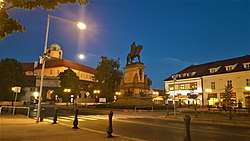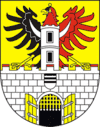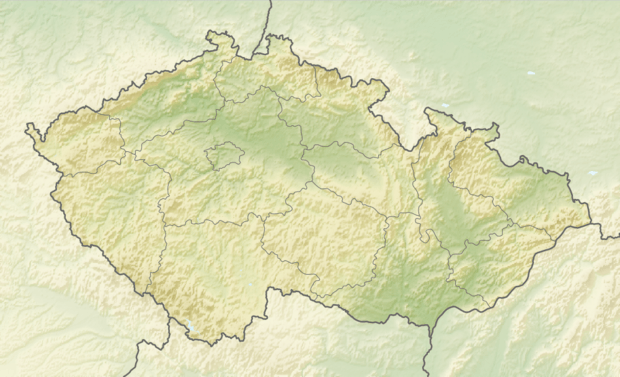Poděbrady
Poděbrady (Czech pronunciation: [ˈpoɟɛbradɪ]; German: Podiebrad) is a spa town in the Central Bohemian Region of the Czech Republic. It has about 14,000 inhabitants. It lies on the river Elbe 50 kilometres (31 mi) east of Prague on the D11 motorway.
Poděbrady | |
|---|---|
Town | |
 | |
 Flag  Coat of arms | |
 Poděbrady Location in the Czech Republic | |
| Coordinates: 50°8′33″N 15°7′8″E | |
| Country | |
| Region | Central Bohemian |
| District | Nymburk |
| First mentioned | 1223 |
| Government | |
| • Mayor | Jaroslav Červinka |
| Area | |
| • Total | 33.70 km2 (13.01 sq mi) |
| Elevation | 185 m (607 ft) |
| Population (2020-01-01[1]) | |
| • Total | 14,377 |
| • Density | 430/km2 (1,100/sq mi) |
| Time zone | UTC+1 (CET) |
| • Summer (DST) | UTC+2 (CEST) |
| Postal code | 290 01 |
| Website | www |
Etymology
An ancient community and a small fortress originated near the ford. It is most likely that the position of this community is reflected in the present name of the town: Poděbrady – "pode brody" = below the ford.
History
The history of Poděbrady reaches back to medieval times. The first written mention is from 1223. A long-distance trade route running from Prague to eastern Bohemia and then on to Silesia and Poland passed through the then-forested landscape interwoven with a dense network of river branches. This important communication intersected the Elbe River to the west of the present town, at a place called Na Vinici.
It obtained the status of town from the king of Bohemia in 1472. A historic milestone in the life of the town was the year 1905, when it was visited by the German estate owner Prince von Bülow. This well-known water diviner found in the inner courtyard of the castle signs of a strong spring, which was later bored to a depth of 97.6 metres (320 ft). The discovery of carbonic mineral water resulted in the opening of the first spa in 1908. After World War I Poděbrady rapidly changed into a spa town which from 1926 specialized in the treatment of cardiovascular diseases, rapidly gaining renown not only in the Czech Republic, but also abroad in countries including Austria, Germany, Russia and the United States.[2]
Flag and Emblem
The town acquired its emblem in 1472 from the sons of King George of Poděbrady. His description reads as follows: In a gold shield, a silver block wall, culminating with nine red-covered shades. In the middle of the wall, a gate with a black hole, a gold gate, and a golden grille, topped with silver spikes. Behind the wall stands a silver round tower with two oblong windows above it, a cornice in the middle, with a battlement of four shadows on its top, and a pointed red roof with a poppy. Behind the tower, as if standing on the wall, black-and-red eagle with golden armor, red tongue and silver crescent over breasts and wings. On the wall above the gate is a silver label with three black stripes in the upper half. The label is a sign of the Lords of Kunštát, ie Jiří of Poděbrady, an eagle and his descendants, the princes of Münsterberk.
The city flag was approved by the Decree of the Ministry of the Interior No. B-8117-25 / 11-47-II / 3 dated August 20, 1948. The aspect ratio is 2:3.
Points of interest
In Poděbrady[3] attractions include lakes for swimming, a riding school and tennis courts.[2]
Near Poděbrady, there is a longwave transmitter used for transmitting meteorological reports. It uses a T-antenna mounted on two 150 m-tall guyed masts. The local golf course is located on the site of the transmitter.
Spa
The mineral water that was found in the early 1900s is better known as Poděbradka. The water contains iron deposits; if left over the course of a few days a rust-like deposit will settle at the bottom and will stain plastic bottles. There are four free public taps where people are able to obtain Poděbradka. There is also a refined version of Poděbradka that is not as heavy with the iron deposits that can be purchased from most stores in the Czech Republic.
Lázně Poděbrady, a. s. (Spa Poděbrady, Inc.) is a Czech spa provider in Poděbrady. Since 1908, when mineral water “Poděbradka” was discovered, thousands patients have come to Poděbrady to treat their health problems and relax.[4]
Territorial inclusion
The history of territorial integration includes the period from 1850 to the present. The chronological overview shows the territorial administrative jurisdiction of the municipality in the year when the change occurred:
- 1850 Czech country, Jičín region, political and judicial district of Poděbrady
- 1855 Czech land, region Čáslav, court district Poděbrady
- 1868 country Czech, political and judicial district of Podebrady
- 1939 Czech Land, Oberlandrat Kolín, political and judicial district of Poděbrady
- 1942 Czech Land, Oberlandrat Hradec Králové, Nymburk Political District, Court District of Poděbrady
- 1945 country Czech, administrative and judicial district Poděbrady
- 1949 Prague Region, Poděbrady District
- 1960 Central Bohemian Region, Nymburk District
- 2003 Central Bohemian Region, Nymburk District, Poděbrady Municipality with Extended Competence
Notable people
- George of Poděbrady (1420–1471), King of Bohemia
- Kunigunde of Sternberg (1425–1449), wife of George of Poděbrady, buried here
- Ludvík Kuba (1853–1956), painter, musician and writer
- Jan Trampota (1889–1942), painter, died here
- Josef and Ctirad Mašín, resistance fighters
- Miloš Forman (1932–2018), filmmaker
- Václav Havel (1936–2011), first president of the Czech Republic
- Hans Janowitz (1890–1954), German author
- Marta Kubišová (born 1942), singer and signatory to Charter 77
Twin towns – sister cities
See also
References
- "Population of Municipalities – 1 January 2020". Czech Statistical Office. 2020-04-30.
- Asiedu, Dita (23 April 2003). "The spa town of Podebrady". Radio Prague. Retrieved 16 December 2013.
- "Poděbrady: Titulní stránka". www.mesto-podebrady.cz. Retrieved 2019-05-10.
- "Lázně Poděbrady, a.s. — největší středočeské lázně, wellness a léčebné pobyty blízko Prahy". www.lazne-podebrady.cz (in Czech). Retrieved 2019-05-10.
- "Smlouvy o partnerství a spolupráci" (in Czech). Město Poděbrady. Retrieved 2020-08-11.